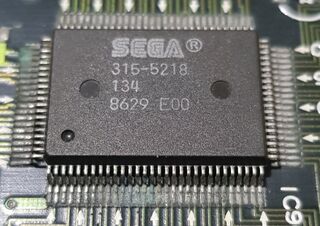Difference between revisions of "SegaPCM"
From Sega Retro
| Line 27: | Line 27: | ||
*Audio output: [[wikipedia:Stereophonic sound|Stereo]] | *Audio output: [[wikipedia:Stereophonic sound|Stereo]] | ||
*[[wikipedia:Pulse-code modulation|PCM]] audio channels: 16 | *[[wikipedia:Pulse-code modulation|PCM]] audio channels: 16 | ||
| − | * | + | *[[wikipedia:Audio bit depth|Audio bit depth]]: 12‑bit |
| − | * | + | *[[wikipedia:Sample rate|Sample rate]]: 31.25 kHz |
==Sega MultiPCM== | ==Sega MultiPCM== | ||
| Line 41: | Line 41: | ||
*Audio output: Stereo | *Audio output: Stereo | ||
*PCM audio channels: 28 | *PCM audio channels: 28 | ||
| − | * | + | *Audio bit depth: 16‑bit |
| − | * | + | *Sample rate: 44.1 kHz (CD quality) |
==References== | ==References== | ||
<references /> | <references /> | ||
Revision as of 06:10, 12 October 2020
| This article needs cleanup. This article needs to be edited to conform to a higher standard of article quality. After the article has been cleaned up, you may remove this message. For help, see the How to Edit a Page article. |

|
| SegaPCM |
|---|
SegaPCM is the colloquial name of a PCM audio chip used by Sega in a number of arcade boards used by AM2 between 1985 and 1991. The chip's part number varies; see below. It was a custom ASIC manufactured by Sega.[1] It was mainly used in the Super Scaler series of high-end Sega arcade systems.
The chip is a 16-channel stereo digital mixing chip that uses external sample ROM. The chip is not pure stereo; it simply duplicates its input data on both left and right channels, allowing you to set the two channel volumes independently of each other to simulate panning. Samples play at a fixed frequency and can be looped. It presumably allows up to 16MB of sample ROM provided by the board but has additional banking hardware with a six bit bank number leading to a total of up to 1GB of addressable sample data (assuming optimal conditions). The sample format is some 8-bit PCM (what form it is is not yet determined by anyone here). Whether or not it produces an analog or digital signal is also undetermined by editors here. Samples must be aligned to some offset (TODO determine).
Rather than using this chip, Sega decided to use a simple DAC for its main arcade board at the time, the Sega System 16 board, for playing back samples, and continued to use a simple DAC in the System 24 before switching to chips by other vendors later.
Contents
Arcade boards with SegaPCM and part numbers
- All games: 315-5218
- All games: 315-5218[2]
- All games: 315-5218 (unconfirmed)
- All games: 315-5218 (unconfirmed)
Technical specifications
The SegaPCM has the following technical specifications:[3][2]
- Audio output: Stereo
- PCM audio channels: 16
- Audio bit depth: 12‑bit
- Sample rate: 31.25 kHz
Sega MultiPCM
The SegaPCM was succeeded by the Sega MultiPCM, a more advanced PCM sound chip that was later used in the Sega System Multi 32, Sega Model 1 and Sega Model 2 arcade boards. It is also known as the Yamaha YMW258-F, based on the Yamaha YMF278 sound chip.
Technical specifications
The MultiPCM has the following technical specifications.[4]
- Manufacturer: Yamaha
- Sega part number: 315-5560
- Yamaha part numbers: YMW258-F / GEW8 / YMFA1005
- Audio output: Stereo
- PCM audio channels: 28
- Audio bit depth: 16‑bit
- Sample rate: 44.1 kHz (CD quality)